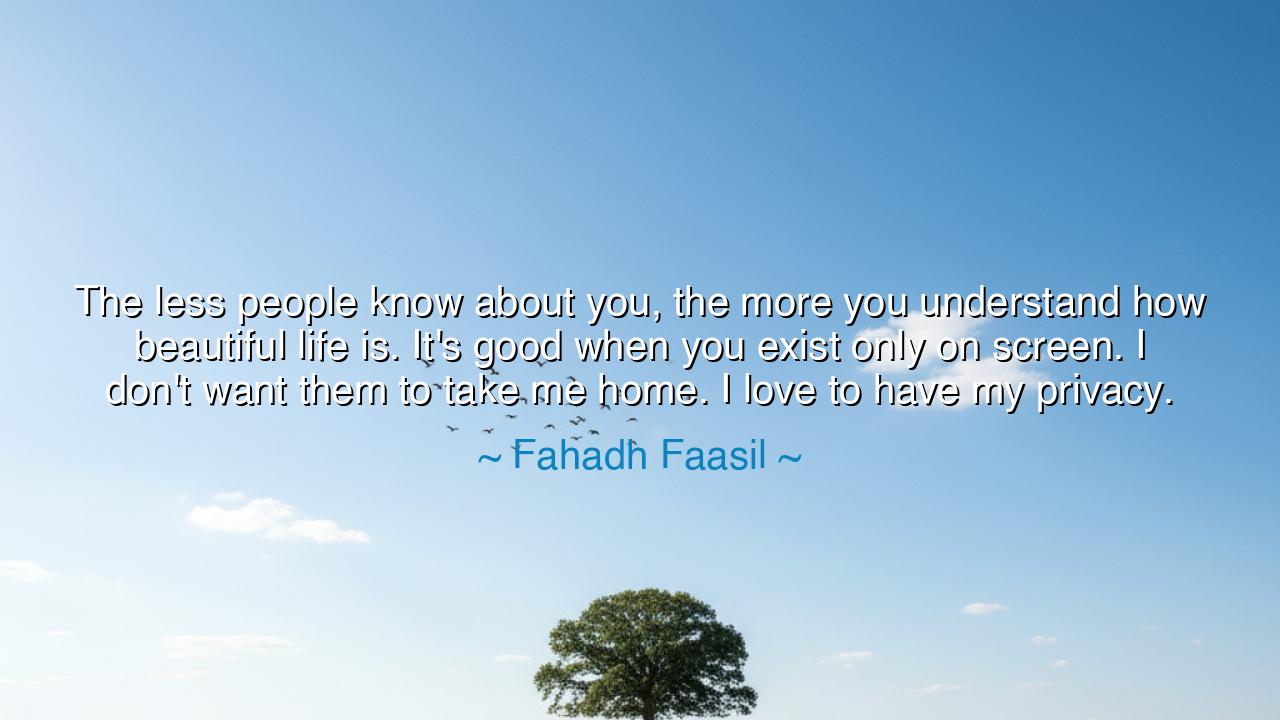
The less people know about you, the more you understand how
The less people know about you, the more you understand how beautiful life is. It's good when you exist only on screen. I don't want them to take me home. I love to have my privacy.






The words of Fahadh Faasil, when he said, “The less people know about you, the more you understand how beautiful life is. It’s good when you exist only on screen. I don’t want them to take me home. I love to have my privacy,” are not merely the reflections of an artist weary of fame, but the timeless wisdom of a soul that has seen the cost of visibility. His words carry the quiet weight of those who have walked through the noise of the world and discovered that peace lies in mystery. Beneath their calm humility lies a lesson as old as the mountains — that the more we guard the sanctity of our inner life, the more we taste the sweetness of existence.
In the ancient days, philosophers spoke of the inner sanctuary of the self. The Stoics called it the citadel of the soul, a place no man could invade. The sages of the East called it the still pond of consciousness, where truth reflects undisturbed by the winds of attention. Fahadh’s words echo this eternal wisdom: that life loses its beauty when it becomes spectacle, and that the deepest joys are not for the crowd but for the heart in silence. To “exist only on screen” is not to reject art, but to preserve identity — to draw a sacred line between what is performed and what is lived.
The ancients understood the danger of too much knowing. When heroes were lifted high, their lives ceased to be their own. Consider Marcus Aurelius, the philosopher-king. Surrounded by senators, soldiers, and slaves, he carried a solitude that even his throne could not touch. “Withdraw into yourself,” he wrote, “and the inner realm will always be open to you.” So too does Fahadh speak from that same impulse — the desire to remain whole amidst a world that demands exposure. His words are not about hiding, but about keeping the flame of selfhood from being consumed by the crowd’s gaze.
In this age of ceaseless revelation — where every meal, thought, and sorrow is cast into the public square — the artist’s longing for privacy is a rebellion, a sacred refusal. To live unseen is to live freely. To let the world know too much is to invite it to carve away what is most delicate and true. As the poet Rainer Maria Rilke once wrote, “Only in solitude can one create, for only in solitude is one whole.” Fahadh’s restraint is not shyness; it is strength, the quiet might of a man who knows that what is most beautiful cannot survive in constant light.
And yet, there is tenderness in his confession: “I love to have my privacy.” It is not the pride of one who hides, but the gratitude of one who has found peace in quiet living. For to be unseen is not to be lonely — it is to be free from performance, to wake each morning unmasked, to breathe without the weight of expectation. In such solitude, life regains its purity. The colors return, the mind clears, and one begins to see — not through the eyes of others, but through one’s own soul.
Let the listener of these words remember: the world will always hunger for stories, faces, and names. It will always ask for more of you — your thoughts, your life, your heart. But there is wisdom in keeping part of yourself untouched. The flower that blooms in secret is no less radiant; the river that flows unseen still nourishes the earth. Guard your mystery, for it is the soil from which authenticity grows.
So the lesson is this: cherish your privacy as you would your peace. Do not measure your worth by how widely you are known, but by how deeply you are understood by yourself. Step back from the noise, from the glowing screens and endless chatter, and rediscover the beauty of being unseen. For the less the world knows of you, the more room life has to reveal itself to you — in the hush of dawn, in the breath between moments, in the quiet joy of simply existing. And when you return to the world, let your art speak — but let your soul remain your own.






AAdministratorAdministrator
Welcome, honored guests. Please leave a comment, we will respond soon